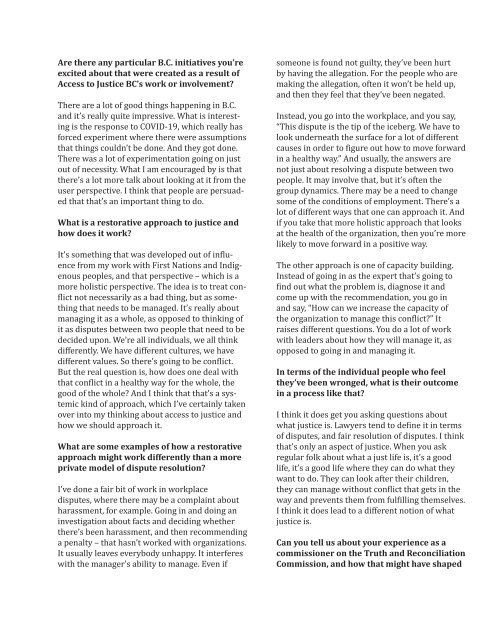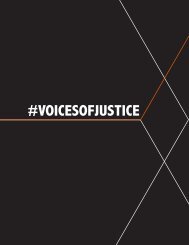Jane Morley – The Justice Hack – Voices of Justice Magazine 2021
A conversation with Jane Morley, QC, Strategic Coordinator with Access to Justice BC, for Voices of Justice, a project that discusses access to justice in British Columbia.
A conversation with Jane Morley, QC, Strategic Coordinator with Access to Justice BC, for Voices of Justice, a project that discusses access to justice in British Columbia.
- No tags were found...
You also want an ePaper? Increase the reach of your titles
YUMPU automatically turns print PDFs into web optimized ePapers that Google loves.
Are there any particular B.C. initiatives you’re<br />
excited about that were created as a result <strong>of</strong><br />
Access to <strong>Justice</strong> BC’s work or involvement?<br />
<strong>The</strong>re are a lot <strong>of</strong> good things happening in B.C.<br />
and it’s really quite impressive. What is interesting<br />
is the response to COVID-19, which really has<br />
forced experiment where there were assumptions<br />
that things couldn’t be done. And they got done.<br />
<strong>The</strong>re was a lot <strong>of</strong> experimentation going on just<br />
out <strong>of</strong> necessity. What I am encouraged by is that<br />
there’s a lot more talk about looking at it from the<br />
user perspective. I think that people are persuaded<br />
that that’s an important thing to do.<br />
What is a restorative approach to justice and<br />
how does it work?<br />
It’s something that was developed out <strong>of</strong> influence<br />
from my work with First Nations and Indigenous<br />
peoples, and that perspective <strong>–</strong> which is a<br />
more holistic perspective. <strong>The</strong> idea is to treat conflict<br />
not necessarily as a bad thing, but as something<br />
that needs to be managed. It’s really about<br />
managing it as a whole, as opposed to thinking <strong>of</strong><br />
it as disputes between two people that need to be<br />
decided upon. We’re all individuals, we all think<br />
differently. We have different cultures, we have<br />
different values. So there’s going to be conflict.<br />
But the real question is, how does one deal with<br />
that conflict in a healthy way for the whole, the<br />
good <strong>of</strong> the whole? And I think that that’s a systemic<br />
kind <strong>of</strong> approach, which I’ve certainly taken<br />
over into my thinking about access to justice and<br />
how we should approach it.<br />
What are some examples <strong>of</strong> how a restorative<br />
approach might work differently than a more<br />
private model <strong>of</strong> dispute resolution?<br />
I’ve done a fair bit <strong>of</strong> work in workplace<br />
disputes, where there may be a complaint about<br />
harassment, for example. Going in and doing an<br />
investigation about facts and deciding whether<br />
there’s been harassment, and then recommending<br />
a penalty <strong>–</strong> that hasn’t worked with organizations.<br />
It usually leaves everybody unhappy. It interferes<br />
with the manager’s ability to manage. Even if<br />
someone is found not guilty, they’ve been hurt<br />
by having the allegation. For the people who are<br />
making the allegation, <strong>of</strong>ten it won’t be held up,<br />
and then they feel that they’ve been negated.<br />
Instead, you go into the workplace, and you say,<br />
“This dispute is the tip <strong>of</strong> the iceberg. We have to<br />
look underneath the surface for a lot <strong>of</strong> different<br />
causes in order to figure out how to move forward<br />
in a healthy way.” And usually, the answers are<br />
not just about resolving a dispute between two<br />
people. It may involve that, but it’s <strong>of</strong>ten the<br />
group dynamics. <strong>The</strong>re may be a need to change<br />
some <strong>of</strong> the conditions <strong>of</strong> employment. <strong>The</strong>re’s a<br />
lot <strong>of</strong> different ways that one can approach it. And<br />
if you take that more holistic approach that looks<br />
at the health <strong>of</strong> the organization, then you’re more<br />
likely to move forward in a positive way.<br />
<strong>The</strong> other approach is one <strong>of</strong> capacity building.<br />
Instead <strong>of</strong> going in as the expert that’s going to<br />
find out what the problem is, diagnose it and<br />
come up with the recommendation, you go in<br />
and say, “How can we increase the capacity <strong>of</strong><br />
the organization to manage this conflict?” It<br />
raises different questions. You do a lot <strong>of</strong> work<br />
with leaders about how they will manage it, as<br />
opposed to going in and managing it.<br />
In terms <strong>of</strong> the individual people who feel<br />
they’ve been wronged, what is their outcome<br />
in a process like that?<br />
I think it does get you asking questions about<br />
what justice is. Lawyers tend to define it in terms<br />
<strong>of</strong> disputes, and fair resolution <strong>of</strong> disputes. I think<br />
that’s only an aspect <strong>of</strong> justice. When you ask<br />
regular folk about what a just life is, it’s a good<br />
life, it’s a good life where they can do what they<br />
want to do. <strong>The</strong>y can look after their children,<br />
they can manage without conflict that gets in the<br />
way and prevents them from fulfilling themselves.<br />
I think it does lead to a different notion <strong>of</strong> what<br />
justice is.<br />
Can you tell us about your experience as a<br />
commissioner on the Truth and Reconciliation<br />
Commission, and how that might have shaped



